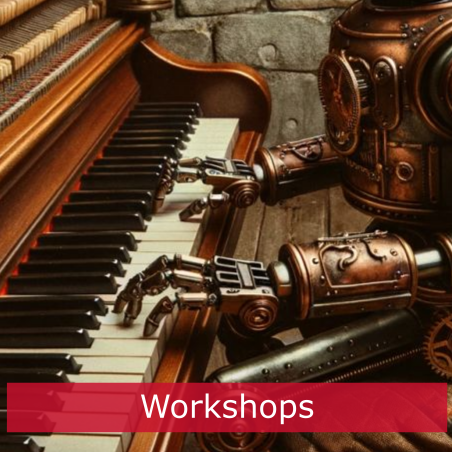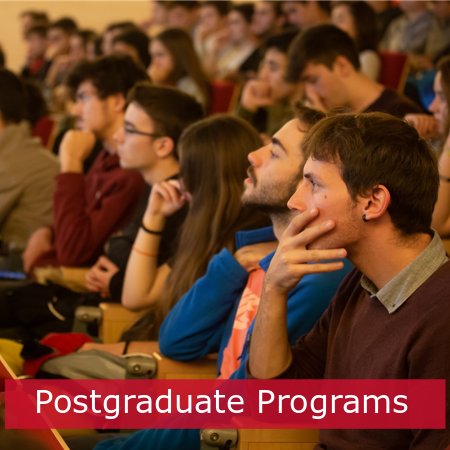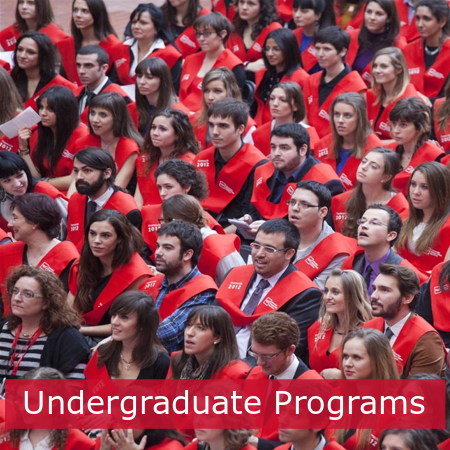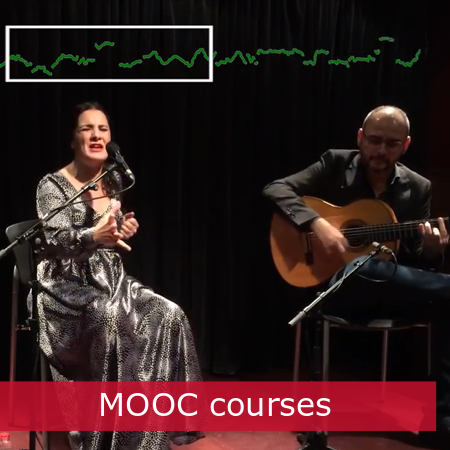Education
Most MTG researchers are involved as students or teachers in:
- PhD of the Dept. ICT of the UPF
The PhD program has a duration of 3 or 4 years. The students develop their research skills by carrying out a thesis under the supervision of a faculty member of the MTG, typically within a predefined research project and in close collaboration with other researchers of the group. By doing a PhD, the student develops a systematic understanding of the sound and music computing field and develops the skills and learns the research methods needed to conceive, design, and implement a substantial research plan with academic rigour. The result of the thesis is an original research that extends the frontiers of knowledge of the field at a level that merits international publication and that contributes to foster technological progress in both academic and professional contexts.
- Master in Sound and Music Computing of the Dept. ICT of the UPF
By doing this master, the students become competent with the state of the art of sound and music computing. The program combines practical and theoretical approaches in topics such as audio signal processing, machine learning, perception & cognition, interactive systems, computational musicology, and semantic technologies, giving the scientific and technological background needed to start a research or professional career. It prepares its students for the research and development tasks that support practical applications related to the analysis, description, synthesis, transformation, and production of sound and music signals.
There are several undergraduate programs where MTG researchers teach and thus the students have the chance to get involved with MTG projects and activities:
- Bachelor's degree in Audiovisual Systems Engineering of the Dept. ICT of the UPF
The main objective of this bachelor's degree programme is to produce versatile, flexible, creative, competitive professionals capable of conceiving and designing audio, video and multimedia systems, working with specialists in related technologies, and making decisions on technological matters on the basis of cost, quality, safety, time and respect for the principles of their trade.
- Bachelor's degree in Computer Engineering of the Dept. ICT of the UPF
The degree in Computer Engineering provides, on the one hand, fundamental and strong training in computer science which enables for the exercise of the profession and, on the other hand, it has an orientation towards digital communication, which enables to take optional plans focused on audiovisual systems, communications and multimedia contents, intelligent systems and networks and telematic services.
- Bachelor's degree in Mathematical Engineering in Data Science of the Dept. ICT of the UPF
The degree proposes a solid training in mathematics and computer science that the student can extend to different types of data such as natural language, images, video, audio or music, as well as in those knowledge specific areas that use massive data, such as personalised medicine, social network analysis, logistics or business, among others.
- Bachelor's degree in Music, speciality in Sonology of the ESMUC
The Bachelor of Music, speciality in Sonology, is intended to provide students with the necessary knowledge and skills for an excellent professional development in the area of musical technology within an eminently musical context, and to prepare them to critically face the many problems that technology causes when it supports the creation, transmission and dissemination of music in its different formats.

The MTG also offers specialized workshops:
One-week long hands-on workshop targeted to people from diverse brackgrounds and aimed to give them the needed competences for becoming active in the field of Generative Music AI. The workshop is organized by the Sound of AI in partnership with the Music Technology Group. The workshop is organized at least once a year.
Researchers of the MTG are behind the following online courses:
- Audio Signal Processing for Music Applications on Coursera
In this course, you will learn about audio signal processing methodologies that are specific for music and of use in real applications. We focus on the spectral processing techniques of relevance for the description and transformation of sounds, developing the basic theoretical and practical knowledge with which to analyze, synthesize, transform and describe audio signals in the context of music applications. The course is based on open software and content. The demonstrations and programming exercises are done using Python under Ubuntu, and the references and materials for the course come from open online repositories. We are also distributing with open licenses the software and materials developed for the course.
- North Indian Classical Music on Kadenze
This course presents the fundamental elements of North Indian Classical Music, from the Swara (note) and Laya (tempo) to the concepts of Raga (melodic framework) and Tala (rhythm framework). By the end of the course, the student will be able to sing basic scales and patterns and will be prepared to explore and practice the more advanced concepts of composition, development and performance presented in the subsequent two courses of the program.
- Cante Flamenco Tech on Miríadax_
Cante Flamenco Tech is a course that aim is to teach cante flamenco with a technological emphasis. For this reason, the project integrates current sound analysis and music technologies in its application to one of the most characteristic aspects of cante flamenco, such as its vocal resources, which gives an interdisciplinary approach that integrates the acoustic fields, the sound processing and the singing.
Online Educational Materials
As part of courses and tutorials given by MTG researchers, here are some useful educational materials:
- Computational Methods For Supporting Corpus-Based Research On Indian Art Music, webbook for a tutorial given at ISMIR 2022
- Audio Signal Processing for Music Applications, software and materials used in Audio Signal Processing class of SMC Master
- Music Information Retrieval, software used in MIR class of SMC Master
- Essentia Python tutorial, hands-on tutorial for complete newcomers to Essentia
- Introduction to Music Information Retreival using Essentia.js, materials of a tutorial given at WAC 2021
- Music Classification: Beyond Supervised Learning, Towards Real-world Applications, materials of a tutorial given at ISMIR 2021
- Computational Approaches for Analysis of Non-Western Music Traditions, materials of a tutorial given at ISMIR 2018
- Natural Language Processing for Music Information Retrieval, videos and materials of a tutorial given at ISMIR 2017
- Music Information Retrieval: Overview, Recent Developments, and Future Challenges, materials of a tutorial given at ISMIR 2016
- Jingju music: concepts and computational tools for its analysis, videos and materials of a tutorial given at ISMIR 2014



